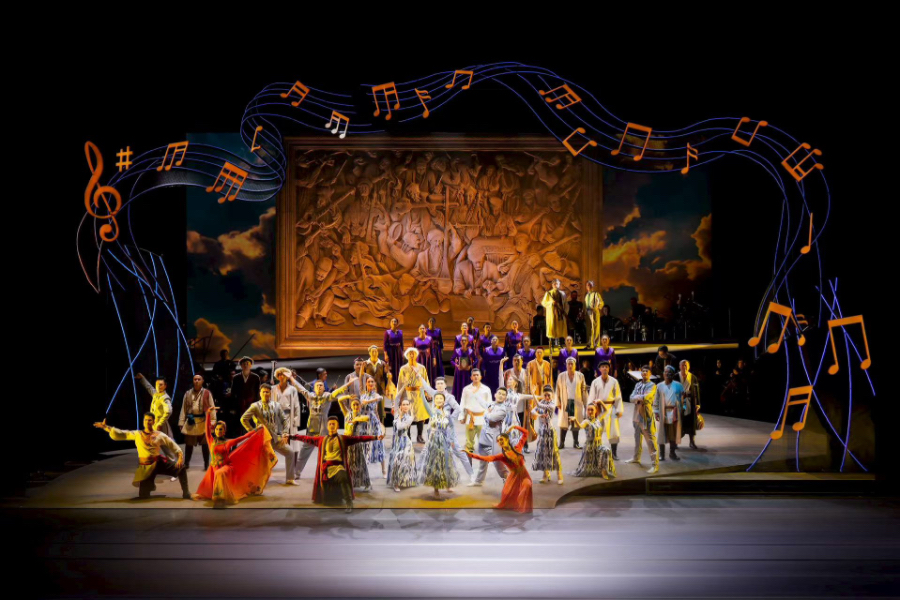
The Muqam Art Troupe performs "The Love of Muqam: Wan Tongshu." [Photo provided to China.org.cn]
The Muqam Art Troupe of Xinjiang Art Theater's innovative new opera "The Love of Muqam: Wan Tongshu" proved a hit with audiences on Aug. 4-5 at the 7th China Xinjiang International Dance Festival.
In 2008, Uyghur Muqam of Xinjiang was inscribed on UNESCO's Representative List of the Intangible Cultural Heritage of Humanity, becoming a significant symbol of Chinese culture. "The Love of Muqam: Wan Tongshu" recreates, in opera form, the history of the salvage and protection of this precious heritage.
Focusing on the 1950s, the opera tells the true story of musician Wan Tongshu, who was tasked by the Chinese central government with salvaging the "Twelve Muqam" in Xinjiang, traveling there with his wife and daughter. Under the leadership of the CPC and with support from people of all ethnic groups, he overcame many difficulties to complete recording and music transcription, eventually overseeing the publication of the two-volume "Twelve Muqam" score, ensuring this "Pearl of the Silk Road" was passed down.
Wang Shaohui, the actor who plays Wan Tongshu, explained: "This opera balances realism and lyricism, showcasing the remarkable contributions of Wan, his wife and other folk artists."
As an innovative work developed by the troupe over nearly two and a half years, the opera has achieved multiple breakthroughs. Its executive director Islamjan Waris noted: "We combined Muqam — an art form integrating song, dance and music — with opera, leveraging the narrative strengths of opera to highlight its cultural essence and enhance the story's appeal."
The production incorporates modern concepts such as AI and digital museums. Lyu Wei, who plays Xiatiguli, a Muqam digital designer, explained: "Xiatiguli serves as a link between history and the present, using time-travel elements to display the perseverance of predecessors and contemporary inheritance. I also play the young girl Abidan and a student, using these three roles to embody the fusion of tradition and digital technology."
On stage, the orchestra, dancers and singers jointly perform the authentic essence of Muqam as an integration of song, dance and music. The opera also features a highly challenging dance form in Uyghur Muqam art for the first time, allowing audiences to experience the elegance of traditional art.
The actors went to great lengths in preparing for their roles. Wang portrays Wan across a range of ages, from as young as 25 all the way up to 82, gaining insight through historical research and visits to memorial halls: "He was reserved yet passionate; his love for Muqam transcended personal and family ties, and he was willing to dedicate his life to this treasure. Such purity is moving."
Jia Qianqian, who plays Wan's wife Lian Xiaomei, noted that she also developed a deep understanding of her role through research. "Lian was gentle yet resilient, traveling from Beijing to Xinjiang to undertake recording work," she said. "The 'stay or leave' decision in the opera — remaining to protect Muqam after losing their child — elevates personal love to universal compassion, embodying the power of ethnic unity."

Actors perform in "The Love of Muqam: Wan Tongshu." [Photo provided to China.org.cn]
The opera received enthusiastic feedback after its premiere. "Audiences of all ages and ethnicities connected with it," Wang said. "Selected excerpts from 'Twelve Muqam' resonated with all ethnic groups, while the segments sung in Mandarin can also be understood by all audience members, allowing them to feel immersed in the story."
Islamjan Waris noted that despite opera's perceived accessibility barriers, the popularity of Muqam in Xinjiang meant the work was well-received. "Tickets sold out quickly, which shows that audiences have embraced this innovative approach," he said.
The creative team retraced Wan's footsteps during fieldwork in Hami, Kashgar and other regions. "Records show that there were equipment shortages back then: the steel wire recorders produced distorted sounds due to unstable voltage, and the wires easily broke, leaving people with cuts all over their hands when making repairs," Islamjan Waris noted, adding that these authentic details enhanced the story's emotional impact.
"From an article by a Xinjiang Daily reporter, we learned there were 437 wire breaks during the recording and repair process," Lyu added.
From steel wire recordings in the desert to digital presentations on stage, "The Love of Muqam: Wan Tongshu" not only showcases Muqam's charm but also tells the story of generations of guardians who have written a legacy of inheritance with love and perseverance, conveying China's vivid practice of preserving and innovating its cultural heritage to the world.


 Share:
Share: 




 京公網安備 11010802027341號
京公網安備 11010802027341號